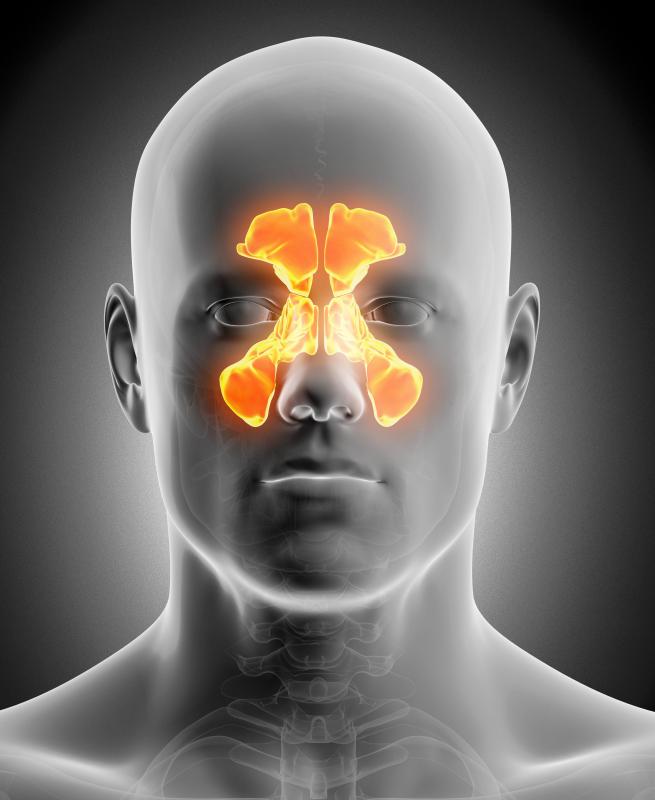At TheHealthBoard, we're committed to delivering accurate, trustworthy information. Our expert-authored content is rigorously fact-checked and sourced from credible authorities. Discover how we uphold the highest standards in providing you with reliable knowledge.
What is an Antrostomy?
An antrostomy is a surgical procedure in which the maxillary sinus is opened so that it can drain properly, while also being cleared out by the surgeon to remove materials which may have contributed to inflammation. It can be combined with surgery to fix a deviated septum in order to address chronic nasal and sinus problems. This procedure is usually performed by an ear, nose, and throat (ENT) surgeon who specializes in handling surgical procedures of this nature.
A patient who needs an antrostomy usually has recurrent sinusitis, in which the sinuses become inflamed repeatedly. The inflammation causes pain around the cheekbone which may migrate down towards the jaw. It also leads to blockage of the sinus, which can cause infection to set in as bacteria become trapped with no outlet. Antibiotic medications can sometimes resolve the problem, but in other cases, antrostomy and other sinus surgeries may be required. As with any surgery, there are risks to an antrostomy, but they can be reduced by working with experienced surgical teams.

In an antrostomy, the surgeon's goal is to reopen the sinus so that it can drain. Sometimes, a new drain must be put in place because the sinus cannot drain normally at the usual location. The surgery starts with a patient evaluation in which the nose is inspected, medical imaging studies are taken, and the patient meets with an anesthesiologist for the purpose of discussing anesthesia problems.

The surgery itself lasts from one to three hours, with the patient under general anesthesia. The surgeon uses an endoscope to insert tools up the nose to reach the maxillary sinus in a minimally invasive technique. The sinus is drained and cleared, and the surgeon inspects the area for any signs of irregularities which might contribute to sinus infections and other problems. At the conclusion of the surgery, the patient can be taken into recovery and monitored while he or she wakes up.

Antrostomy is usually an outpatient procedure. Once the patient is awake and comfortable, he or she can be sent home. It is usually advised that arrangements for a ride be made ahead of time, because the patient may be too dazed to drive comfortably or safely. The creation of a surgical opening for sinus drainage should help reduce the risk of maxillary sinusitis in the future because the sinus will be able to drain freely, limiting buildup of materials which lead to inflammation. The patient will also be given antibiotics to limit infection.
AS FEATURED ON:
AS FEATURED ON:















Discussion Comments
You guys have spoken well. But I will tell you categorically that the surgical procedure is not as simple as described. No one will undergo such a procedure and go back home that same day. First of all, the individual will be sedated, by the time he/she wakes up, the nose has been tightly packed. This will not be removed for at least one week. Believe me that this one week is a week of "Had I Known, Useless Doctor!, God please Help me! Lord I surrender my life to you!" and so on. The mouth becomes the breathing passage.
The day the pack is removed marks the beginning of slight happiness. Because you can actually breathe during the day, but at night the nose becomes blocked. The appointment with your doctor is not daily. When you go for the clearing of the nasal passages, you feel some sharp pains when the doctor tries to cut off the dried clotted blood from the nasal passage.
The healing continues gradually while you take your medication.
It will get to a point when your nose brings out a bad odor. This is also as a result of the clots inside the nose and regular decongestion of the sinuses.
The healing process takes some time. but don't ever involve yourself with hard exercises like boxing, blowing of trumpets, fighting, heading of football or singing. Remember your brain has undergone series of pain. It will be detrimental and cause more pains.
I did not say this as a doctor, but as one who underwent the procedure. Of a truth, it really helped me a great deal. The chronic nasal condition has gone forever.
It is good to do it, but do it when ready!
After my antrostomy, I had a stuffy nose and couldn't sleep too comfortably for about a week after. But then everything cleared up and I think it was the best decision I took. The discomfort of surgery was nothing compared to the pain and irritation I had from my sinus infections over the years. I'm so happy I had it done.
The one thing I'd like to mention here, because no one ever mentioned it to me before the surgery, is that my voice changed a little afterward. I don't know if it really changed or if I'm hearing it that way, but it seems different and I have heard the same thing from several other people who had the surgery since then. It's not really a big deal, but something to note.
@anamur-- There is nothing to be worried about. The procedure is really minor. I had it done a couple of years ago. I was under general anesthetic during and was taking painkillers after surgery so I really didn't feel any pain. There was some drainage and I had to go back for checkup and cleansing of the nasal passage a week after. Everything was back to normal after a week and I have been so relieved.
I don't know about the details of your sinus issue but I think that if the doctor recommends an antrostomy, it's probably necessary. I had repetitive sinus infections, constant pain and couldn't smell as well when I decided to have the surgery. If the sinuses keep getting infected and don't clear up with medications, surgery is kind of inevitable because it just gets worse after that point.
Just keep all this in mind, as you said you might need to undergo it if you have infections in the future. But don't be afraid, I'm sure it'll be fine.
I almost had to undergo an antrostomy last year. My sinuses got really bad, it was completely stuffed and I had this horrible migraine and unbearable pain around my forehead that stayed for weeks. The doctor said that I needed an antrostomy right away. I did not want to undergo surgery. I know it's not that bad and is considered a minor procedure but I'm scared of going under the knife.
Right around that time, a friend suggested to me an acupuncture specialist that she goes to. I went for three acupuncture treatments and thankfully it worked. I was really stressed at that time too and I think the acupuncture helped by relieving some of the stress points.
If my sinuses continue like this, I might eventually have to get an antrostomy and I will have to beat my fear of surgery at that point. Until then, I'm going to try to manage it with other methods if I can.
Post your comments